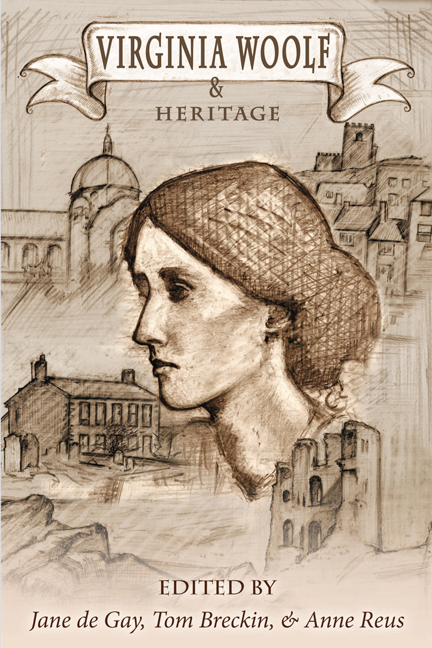Book contents
- Frontmatter
- Contents
- Introduction
- List of Abbreviations
- HERITAGE: A DEBATE
- “Her—it—age!”: Virginia Woolf and Syllabic intervention— Or, “Heritage is a Kim Novak word”
- HERITAGE, EDUCATION, AND MENTORING
- HERITAGE SPACES
- LITERARY AND CULTURAL HERITAGES
- QUEER PASTS
- MODERNISM AND HERITAGE
- WRITING LIVES AND HISTORIES
- WOOLF'S LEGACIES
- FINALE
- Notes on Contributors
“Her—it—age!”: Virginia Woolf and Syllabic intervention— Or, “Heritage is a Kim Novak word”
from HERITAGE: A DEBATE
- Frontmatter
- Contents
- Introduction
- List of Abbreviations
- HERITAGE: A DEBATE
- “Her—it—age!”: Virginia Woolf and Syllabic intervention— Or, “Heritage is a Kim Novak word”
- HERITAGE, EDUCATION, AND MENTORING
- HERITAGE SPACES
- LITERARY AND CULTURAL HERITAGES
- QUEER PASTS
- MODERNISM AND HERITAGE
- WRITING LIVES AND HISTORIES
- WOOLF'S LEGACIES
- FINALE
- Notes on Contributors
Summary
“Ja—cob! Ja—cob!” Archer shouted.
“Scarborough,” Mrs. Flanders wrote on the envelope, and dashed a bold line beneath; it was her native town; the hub of the universe. But a stamp? She ferreted in her bag; then held it up mouth downwards; then fumbled in her lap, all so vigorously that Charles Steele in the Panama hat suspended his paint-brush.…
“Ja—cob! Ja—cob!” Archer shouted.
…“Over there—by the rock,” Steele muttered, with his brush between his teeth, squeezing out raw sienna, and keeping his eyes fixed on Betty Flanders's back.
“Ja—cob! Ja—cob!” shouted Archer, lagging on after a second.
The voice had an extraordinary sadness. Pure from all body, pure from all passion, going out into the world, solitary, unanswered, breaking against rocks—so it sounded. (JR 8–10)
What Woolf has Archer do unto Jacob in the opening pages of Jacob's Room— “Ja—cob! Ja—cob!”—I propose doing unto that most unWoolfian word: “Her—it—age!” Now we have three words that truly do open up Woolfian portals, obsessed as her writing is by gendered pronouns and the passing of time. Is this trisyllabic utterance now a form of urgent shorthand, telegraphing the message: “She has become an object over time”? I can certainly see that message as fundamental to the concept of “heritage.” For “Heritage” speaks the sustained historical period of eugenically entitled patriarchal subjectivity that we still endure. Heritage is a toxic political and social convention— reifying, commodifying, subordinating, gendering and ranking all that it encounters.
Syllabling “Her—it—age!” also opens up the word's fantastic capacity for mondegreen, which did tempt me to write a paper on “Woolf 's Hairy Stage,” an argument predicated on the aesthetics of coiffure in the works written in that era of Woolf 's conventional long, loose locks and her badly bundled chignon— before she got herself that smart shingled bob in 1927! Or predicated on the gender and canine stakes at that formative moment when the hirsute family pet mongrel Shag (male), and Gurth the equally hairy (and male) sheepdog whom she shared with her sister Vanessa, were superseded in her affections in 1906 by the intermediary shorthaired and misnamed bitch Hans, the epicene boxer dog (the end of another Woolfian hairy stage).
- Type
- Chapter
- Information
- Virginia Woolf and Heritage , pp. 2 - 8Publisher: Liverpool University PressPrint publication year: 2017



